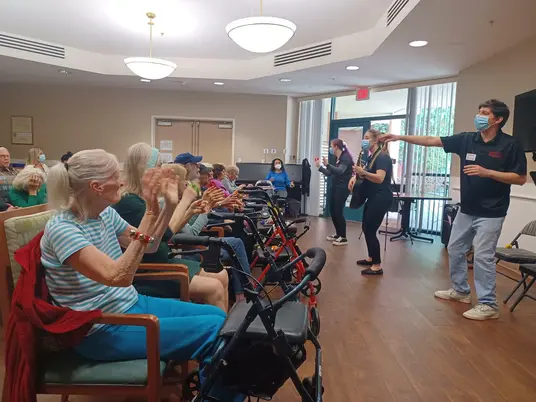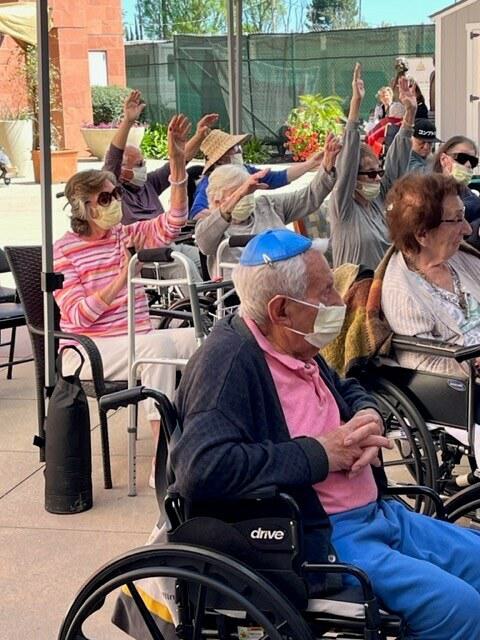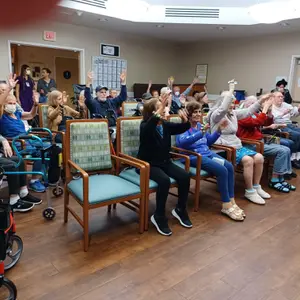Making Music at Los Angeles Jewish Health


Making Music at Los Angeles Jewish Health

Philosopher Friedrich Nietzsche noted that, “Without music, life would be a mistake.” Celebrating life – and the music that makes it worthwhile – is the focus of therapeutic music services at Los Angeles Jewish Health (LAJH).
Conducted in partnership with the Music Therapy program at California State University, Northridge (CSUN), Los Angeles Jewish Health’s therapeutic music services bring CSUN students to the LAJH campus to stimulate and engage residents with population-appropriate activities. The students – juniors and seniors at CSUN – are working toward their Bachelor of Arts in Music Therapy; once they complete their degree, finish a six-month internship (including 1,200 hours of clinical training), and pass a board certification exam, they become board-certified music therapists. CSUN’s Music Therapy program – an important and growing major at the nexus of healthcare and music – is the only one in the California State University system.
“Music therapy helps promote functional changes in behavior,” says Hilary Yip, chair of Music Therapy at CSUN. “It’s based on science – understanding how our bodies and brains react and respond to music. Music therapists work with people from infancy through their senior years, boosting their social and emotional skills, cognitive and motor skills, and the ability to communicate. For instance, music can help reduce the suffering of adolescents with depression and anxiety and assist adults with dementia in accessing their memories.”
Los Angeles Jewish Health’s collaboration with CSUN is new, and Stacy Orbach, LAJH’s director of volunteer services, is already seeing results. “It’s a win-win situation because the students get experience in their field, and our residents benefit from afternoons filled with music and joy,” she says. “Music is so powerful: It can bring older adults back to a particular time and place in their lives. I’ve been amazed watching their reactions as they travel that path.”
Music has always played a central role at Los Angeles Jewish Health, and volunteers frequently visit to share their talents with residents. But the joint effort with CSUN pairs music enjoyment with a more scientific approach.
“One of the things that’s remarkable about the CSUN partnership is that it both benefits our seniors by making them feel good, and it is also data driven, producing findings that can contribute to the body of medical knowledge about aging and potentially improving seniors’ quality of life down the line,” says Dale Surowitz, chief executive officer and president of Los Angeles Jewish Health.

The program is equally beneficial for the students, enabling them to acquire hands-on experience of going into the community and working with clients. “In class, they’re just playing music for each other, but at Los Angeles Jewish Health, they can witness, first-hand, how their music brings a smile to seniors’ faces,” Hilary says. “It’s so rewarding for them to elicit that reaction and to see how they can use music to impact someone else.”
As part of the partnership, Stacy and LAJH Special Programs Coordinator Julie Lockman-Gold make presentations to CSUN Music Therapy students at the start of each semester, introducing them to Los Angeles Jewish Health and to the needs of its senior population. Over the course of the semester, the students build warm relationships with LAJH residents, forming bonds that enhance the seniors’ sense of fulfillment and well-being.
“Our residents couldn’t be more enthusiastic about these interactions,” Julie says. “At the end of every session, they encourage the students to come back any time.”
Early response to the program has made it a standout success. “I’m so delighted by the feedback we’ve received from our seniors,” Stacy says. “We’re in this partnership for the long term.”
